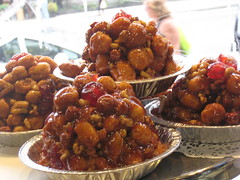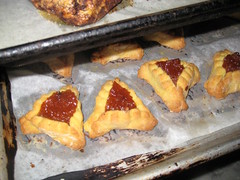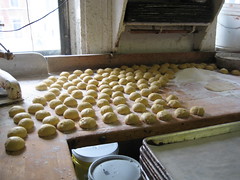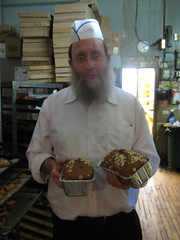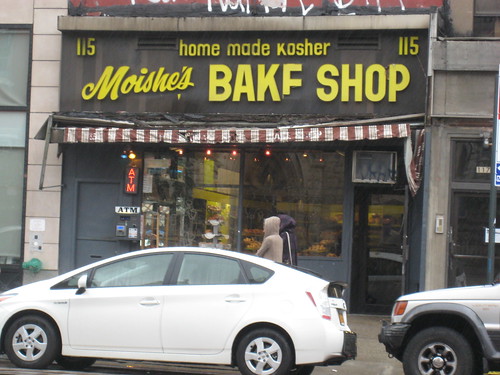Tonight, all over the world, Jews will complete their last meal of the year with a pinch of tagelach, then end their Yom Kippur fast with another sweet bite.
Recipes for the traditional sticky, honey-coated amalgamation of pastry dough, nuts and fruit piled loosely into pyramids are passed down through generations. But, Moishe Perl says, his tagelach is the best.
“The other companies who make it don’t know how to make it,” said Mr. Perl, the Moishe in Moishe’s Home Made Kosher Bake Shop on Second Avenue. And he’s not sharing his recipe. But, he revealed, his version involves four kinds of nuts, two kinds of dried fruit and a special kind of flour.
Many different cultures have a version of tagelach, and its hyper-sweet taste is not for everyone. But people cling to traditions, and so Moishe’s was a busy bakery this last few weeks as Jews celebrated Rosh Hashanah and now, tonight, Yom Kippur, the end of the 10-day-long Jewish new year celebration.
Yom Kippur is a day of prayer, reflection, atonement, and, for the observant, a 25-hour fast begins just before sundown tonight. Two meals bookend the fast: an afternoon feast to fuel up for the long day ahead, and the breaking of the fast shortly after sundown Saturday.
That’s where Moishe’s tagelach comes in.
Mr. Perl said the dish is filled with symbolism: “We all have our ups and downs, we go nuts sometimes, we have our dry moments.” Covering the mixture in honey is a way to “make everything sweet,” or make peace with the events of the year.
Mr. Perl himself has nine children and “somewhere between 48 and 52 grandchildren. It was easier to keep count when I was younger.” His progeny won’t be taking over the family business, though. “I worked very hard, because I didn’t want them to have to hustle like I hustle.”
The modest storefront has seen better days, its yellow block-lettered sign tattered, with the E in “BAKE” missing a prong so that it resembles an F. But what’s a little wear-and-tear for a bakery nearly four decades old? Opened in the fall of 1971 by Mr. Perl, it’s one of the few remaining vestiges of a neighborhood that once housed a bustling Eastern European population, with many Jewish purveyors of food and goods.
“The neighborhood changes every couple of years,” said Mr. Perl, who was in his early 20s when he set up shop. Born in Brooklyn to Romanian parents, he said he had always baked as a child. After attending rabbinical school in Montreal, he returned to New York and opened Moishe’s, first on the Lower East Side. A few years later, he made the move to Second Avenue.
Now a venerable 50-something (he declines to state his exact age) with a salt-and-pepper beard, rimless spectacles, and paper baker’s cap, he hasn’t slowed down and neither has the bakery. Inside is a 50-year-old Universal brick oven, used to bake the shop’s many treats and breads, including challah. “The brick oven gives it that nice crust,” he said. And then there is dough, with a finicky nature that requires a different touch each time. “The dough is like a baby,” he said. “It has to do with the weather, the flour, how much it’s mixed.”
In addition to challah, Moishe’s offers a few dozen items, the selection handwritten on a butcher-paper menu behind the glass counter. The cases are filled with all manner of Jewish treats: hamentaschen (flaky three-cornered pastries filled with various fruit preserves), kichel (sugar-dusted discs that crumble easily when bitten), mondel bread (a biscotti-like sliced cookie). There are also a few nontraditional items—lemon meringue pie, cheese danishes—but everything is prepared to the same exacting Kosher standards, which means all ingredients are certified Kosher, and dairy and non-dairy items are never baked in the same oven.
Mr. Perl is busy this time of year, taking special orders for tagelach from families getting together for holiday meals. But the dessert has also had a few unexpected fans.
“Some people visiting from Italy came to the shop,” Mr. Perl said. “They said it’s very similar to something they had at home. And when they tasted it, they went crazy! They told me, ‘You should come to Italy! You’d make so much money!’”
Have you eaten Moishe’s tagelach? Is it better than your grandmother’s?



